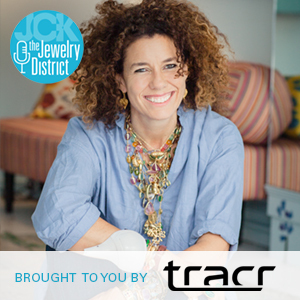
This week, JCK editor-in-chief Victoria Gomelsky and news director Rob Bates talk with London-based jewelry designer Pippa Small. Pippa has traveled extensively and strived to make sure that both her materials and partnerships are sourced with good intentions. Helping tell stories through jewelry has always been her passion, and she shares her hopes and dreams for her business, the environment, and citizens of mineral-producing countries.
Listen Now
Sponsored by Tracr: tracr.com
Show Notes
02:48 Connection to the earth
05:58 Anthropology and design
10:13 Relationships with artisans and customers
17:47 The jewelry business
21:07 Good and bad effects of gold mining
Episode Credits
Hosts: Rob Bates and Victoria Gomelsky
Producer and engineer: Natalie Chomet
Editor: Riley McCaskill
Plugs: @jckmagazine, tracr.com
Show Recap
Connection to the earth
Pippa Small was born in Montreal but grew up in rural Quebec, moving to England when she was 7 years old. Her grandmother, mother, and sister were artists. “It was a family of people who made things,” she says. Her mother also loved to travel, and took Pippa with her around the world.
During those childhood travels, she was always drawn to the jewelry she saw. “There was something about jewelry that for me was not only about stones,” she says. “In some very primal and ancient way…there’s a connection between a sense of the earth and us through a rock…. [In] these traditional communities I’d come across as a child, there was a connection between what they wore and the landscape of the culture that they lived in.”
Anthropology and design
After receiving her master’s degree in anthropology, Pippa worked abroad with nonprofit organizations. In Southeast Asia and India, she dealt with indigenous people who related to jewelry similarly to how she did. That helped spark her interest in designing.
“Quite often, when I’d be with a community, they were as interested in my jewelry as I was interested in theirs,” she says. “And the conversation started: How did you make yours? What materials? What does this mean to you? What does this represent to you?”
At the same time, she was employed by Gucci, working under Tom Ford. The money she earned at Gucci funded her vision for making jewelry in a new way—acknowledging and honoring the work and lives of those who have a role in creating it.
Relationships with artisans and customers
Pippa says that while some of her customers simply want beautiful jewels, a majority are interested in the story behind the piece they purchase. She values the face-to-face interactions that a shop provides, as her discussions about jewelry often spark interesting conversations.
She believes she’s been able to make her name as an ethical jeweler “because it was something that I Ioved, something I saw as a way of life, rather than a marketing opportunity.”
Pippa hopes to give people in the communities she works with—sourcing materials or making jewelry—more of a voice. She’s been doing business with some of them for over 20 years. “The intention is always to make it a long-term, sustainable relationship, because that’s when it’s really powerful and impactful.” Pippa acknowledges that isn’t possible with every business, and she has worked with certain designers for only a season or two.
Recently, she’s worked with the Roma people, who are spread across the world. She says they have a mystique and are often romanticized, but they also face discrimination and occasionally violence. That is why she feels it’s important to tell their story from a different angle.
The jewelry business
Her work has shown how different cultures view jewelry. “Jewelry is about…emotional connection,” she says. “In every culture I’ve worked in, it’s always filled with amazing amounts of fascinating symbolism and story and beliefs. I think it’s just part of jewelry everywhere. And we believe in it too, really, all of us, deep down. It’s got a bit of a magic.”
Pippa has two stores—one in Los Angeles, the other in the Notting Hill district of London. Her dream is to open up a shop in New York City. In the meantime, she also has a wholesale business in the United States.
Good and bad effects of gold mining
Pippa’s journey with “clean gold” began in the early 2000s, after she spotted a newspaper article about how many tons of toxic waste were produced to make a single gold wedding band. “Mortified” and eager for an alternative, she found out about a mine in Bolivia that was piloting “fair trade” mining and she began purchasing from it at a premium price—the site would be certified the world’s first Fairtrade gold mine in 2011.
Her travels have shown her both the harmful and beneficial impact that gold mining can have. In Uganda, she knew of residents who got mercury poisoning after miners dumped the toxic metal into the river. But she also visited areas of Colombia where women could earn money for their families by panning for gold on their own time.
“It changed the way I saw gold. It’s slowly gone from being this metal that held a precious stone to being this beautiful material that can do good.”
Any views expressed in this podcast do not reflect the opinion of JCK, its management, or its advertisers.
- Subscribe to the JCK News Daily
- Subscribe to the JCK Special Report
- Follow JCK on Instagram: @jckmagazine
- Follow JCK on X: @jckmagazine
- Follow JCK on Facebook: @jckmagazine






